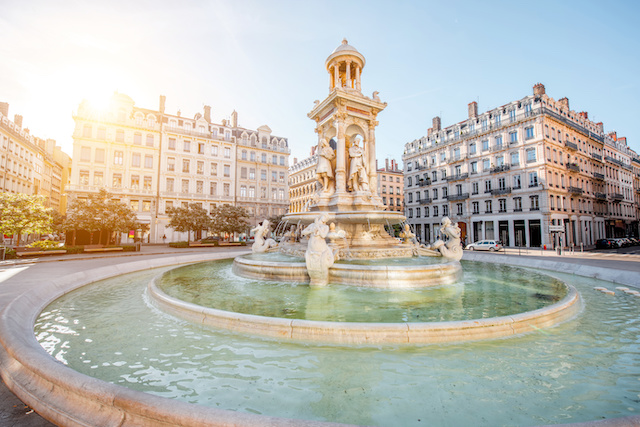Expat Guide to Lyon

Lyon is the second largest French city, with two million inhabitants. The capital of the Rhone-Alpes Region, Lyon has a rich architectural heritage and a multitude of important cultural institutions. Considered to be a creative, innovative and industrial city, Lyon has been listed as a UNESCO World Heritage Centre. It is estimated that there over 50,000 expatriates who have moved to France to live and work in Lyon.
Location and climate
Close to mountains, the sea and Paris, Lyon is well connected to the rest of Europe (4 hours 40 by Eurostar to London and direct flights to three of London’s four airports). Lyon is considered a young city, vibrant, international and very festive. The climate of Lyon and the Rhone is semi-continental with alternating influences of Mediterranean climate, continental and oceanic, with Spring and Autumn being particularly pleasant. Summer can be sweltering with temperatures up to 30 degrees, whilst winters are harsh, marked by sometimes heavy frosts and snowfalls that can go up to 10 cm, which invariably cause huge traffic jams.
Lyon is an easy city to navigate; it’s big enough not to get bored and there are plenty of choices for restaurants, cinemas, culture and day trips, but it is still small enough to walk everywhere.
Culture and Leisure
There are lots of amazing festivals in this French city such as the Fête des Lumières (sound and light show attracting three million people every year) and the Nuits de Fourvière (summer concerts in the Roman amphitheatre). Lyon is constantly being improved too with various dynamic urban developments.
Bridges have been built, car parks turned into jogging and cycle paths, an old military barracks converted into a park, and an old city centre hospital has been transformed into a luxury hotel, shopping gallery and the Cité de la Gastronomie food museum.
Supporting Lyon’s reputation as one of the best places in the world for food. It’s not surprising that Lyon was voted Best Weekend Destination in Europe at the World Travel Awards in 2016. Lyon is also known as the capital of gastronomy, and it is also famous for its football club, Olympique Lyonnais, seven times champions of France.
Lyon is considered to have an excellent quality of life for residents. There are two rivers, a huge park (the largest urban park in France), and if you want to venture to the countryside the Beaujolais and Ardeche areas are close by. There are beautiful lakes such as Annecy, Aix les Bains and Aigebuelette to the East, volcanic scenery in the Puy de Dome area to the West and Roman towns South of Lyon such as Vienne and Avignon.
The Confluence area of Lyon has been developed into an upmarket, residential and cultural area with riverside bars, clubs and restaurants, as well as green areas and a high-end shopping centre. Lyon is also proud of its eco-district and the creation of its WWF sustainable area.
Transportation
Lyon has a driver-less electric shuttle bus for residents and visitors to the city. An alternative to road transport is by “Vaporetto” boat that mainly serves the Confluence area. If you are happy to travel under your own power, Lyon offers a self-service bike scheme throughout the city called VeloV. Parking is not easy in Lyon, despite the underground parking lots. Many people leave their car outside the city and use the bus or the metro to access downtown.
Schools
It is not difficult to find an international school in Lyon for your children. About 6,000 students benefit from the range of international schools in Lyon, some of which offer places from kindergarten through high school.
Ombrosa is an international bilingual private school based in Lyon and Savoie region, which includes kindergarten, primary school, college and high school. The International School (CSI, Cité Scolaire Internationale) is a public school that receives 1,600 students aged 6 to 20 years from over 40 different nationalities. The International School of Lyon (ISL) offers instruction in English to children wishing to follow an international curriculum (IB and IGCSE) from kindergarten to the International Baccalaureate.
If you are considering a move to France either for work or a change of lifestyle and have a young family in tow there is plenty you will need to look at before you move. Click here to learn the pros and cons of moving to France with a young family.
To make sure your move goes as smoothly as possible, we’ve created a detailed moving checklist detailing all you need to prepare for your move.



